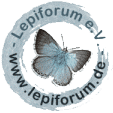Version 17 / 21 vom 18. November 2023 um 14:17:39 von Erwin Rennwald
Länder:

 +13Kontinente:EU
+13Kontinente:EU


 +13Kontinente:EU
+13Kontinente:EUInhalt
2. Diagnose
2.1. Männchen
1: ♂, Finnland, Südwest-Finnland, Hiittinen, 25. Juni 1949 (fot: Pekka Malinen, kleines Bild redaktionell an Standardmaße angepasst), leg. Lankiala, coll. LTKM
2.2. Erstbeschreibung
1-2: Guenée (1845: 186 mit Anmerkung 2) [nach Copyright-freiem Scan auf www.biodiversitylibrary.org]
3. Biologie
3.1. Nahrung der Raupe
- [Asteraceae:] Leucanthemum vulgare [= Chrysanthemum leucanthemum] (Gewöhnliche Margerite)
Kennel (1921: 636) kannte die Raupe noch nicht, äußerte aber einen Verdacht: "Die Raupe wird im Wurzelstock von Chrysanthemum vermutet".
Hancock et al. (2015: 232) berichten: "Ovu,. Laid in June at the stem base of oxeye daisy (Leucanthemum vulgare). Larva. Undescribed. September - April; feeds in the rootstock of oxey daisy (Sterling, 1991). Previous to Sterling rearing this species, its British foodplant was uncertain however Meyrick (1928) had correctly suggested "larva perhaps in the rootstock of Chrysanthemum"." Sterling (1991: 106-107) erhielt aus den von ihm eingetragenen Pflanzen der Margerite immerhin ein Dutzend Falter dieser Art.
(Autor: Erwin Rennwald)
4. Weitere Informationen
4.1. Unterarten
- Dichrorampha senectana pseudocinerosana Obraztsov, 1958
4.2. Literatur
- Erstbeschreibung: Guenée, A. (1845): Essai sur une nouvelle classification des Microlépidoptères et catalogue des espèces européennes connues jusqu'à ce jour. — Annales de la Société entomologique de France. Deuxième Série 3: 105-192.
- Hancock, E.F., Bland, K.P. & J. Razowski (2015): The moths and butterflies of Great Britain and Ireland. Volume 5 (Part 2). Tortricidae, Olethreutinae. - 377 S.; Leiden & Boston (Brill).
- Kennel, J. (1908-1921): Die Palaearktischen Tortriciden. Eine monographische Darstellung mit 24 Tafeln im Farbendruck, einer Stammtafel und mehreren Abbildungen im Text. — Zoologica 21 (54): 1-546, 729-742, Stammtafel, Taf. I-XXIV. Stuttgart. [Digitalisat auf biodiversitylibrary.org]
- Sterling, M. (1991): Dichrorampha senectana (Guenée) bred from C. lecanthemum (L.) ox-eye daisy. — Entomologist's Record and Journal of Variation, 103: 106–107. [Digitalisat auf archive.org]


















